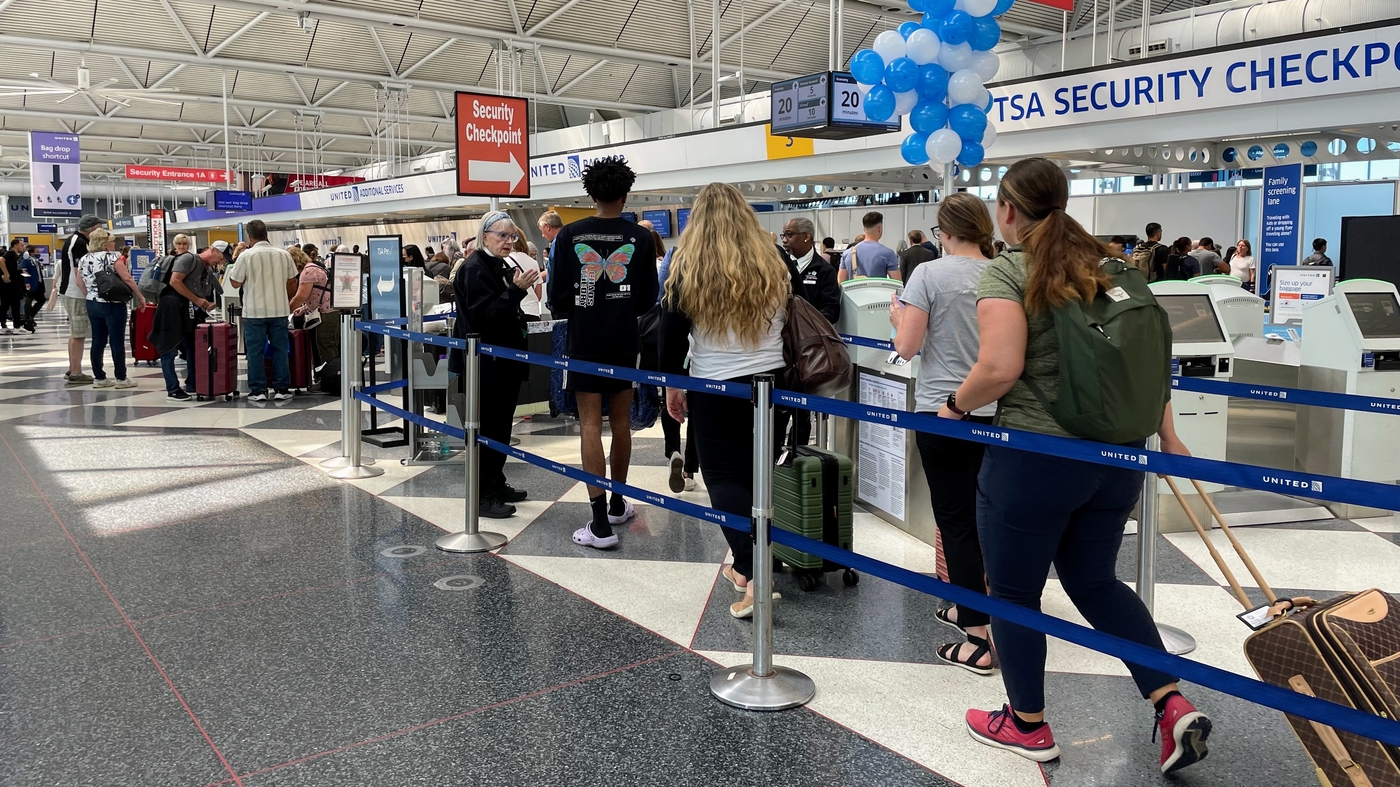
Travelers line up to enter the security checkpoint at Chicago’s O’Hare Airport last summer.
David Schaper/NPR
hide title
change the subtitles
David Schaper/NPR

Travelers line up to enter the security checkpoint at Chicago’s O’Hare Airport last summer.
David Schaper/NPR
Airports around the United States are gearing up for what could be the busiest July 4th travel season in history. The nation’s roads are no different. Traffic may reach unprecedented volumes during the Independence Day holiday.
“With summer vacations in full swing and the flexibility of remote work, more Americans are taking long trips around Independence Day,” said Paula Twidale, senior vice president of AAA Travel, in a press release. “We anticipate this July 4th week to be our busiest ever.”
Approximately 71 million people are expected to take trips for the Independence Day travel period, AAA predicts.
Here’s what you need to know about holiday travel this week.
The TSA sets a new record and prepares for another
Last week, a record 2.99 million passengers passed through US airports in a single day, according to the Transportation Security Administration (TSA). The agency said it is expecting a new travel record this week.
At Philadelphia International Airport, Gerardo Spero, the TSA’s federal director of airport security, is dealing with an 8% increase in passengers this year and is warning travelers to give themselves extra time.
“The best advice I can offer is to get to the airport well in advance of your ticket’s departure time,” Spero said in a press release. “Now more than ever it’s vital to give yourself plenty of time to park or return a rental car, check in with your airline to check bags and prepare for the security checkpoint.”

Spero also said travelers can help each other by being “efficient” in security lines: take off your shoes and belts beforehand, empty your pockets in your luggage and grab a bin early.
At Seattle-Tacoma International Airport — where travel volumes are up 5% — the TSA wants travelers to double-check carry-on bags before arriving at the airport.
“We are asking travelers to be good partners with TSA and make sure they are prepared for the screening process,” TSA Federal Security Director for Washington Greg Hawko said in a statement. “Please do not bring prohibited items in your hand luggage. .”
The airport’s busiest days are expected to be July 3, 7 and 8, according to the Hopper flights website. The company projects Atlanta, Dallas-Fort Worth and Denver airports to be the busiest.
This increase in summer air travel comes amid heightened attention to planemaker Boeing’s quality control practices after a door plug exploded on a 737 Max jet in mid-air earlier this year. However, flying is the safest way to travel.
In the street
Nearly one in five Americans will drive more than 50 miles this July 4th travel season, according to a AAA forecast.
If you want to beat the traffic, drive early. INRIX, a transportation data provider, said driving on Monday should save commuters time. Every day after that, the best time to drive is before 10am
“Drivers in major metro areas can expect the worst traffic delays on Wednesday, July 3, when they leave the city and Sunday, July 7, when they return,” Bob Pishue, transportation analyst at INRIX, said in a statement . “Road trips during the holiday week could take up to 67% longer than normal.”

If you’re preparing for a longer road trip with family and friends, AAA recommends going through this checklist: check children’s car seats, bring an emergency kit (first aid, cables, snacks and water) and map out the itinerary.
At the pump, drivers can expect lower gas prices than last year with a gallon averaging $3.50. In 2023, gas cost $3.53 a gallon and in 2022 it cost nearly $5.
This year, the states with the most expensive gas are California ($4.80), Hawaii ($4.71), Washington ($4.21), Oregon ($4.07), Nevada ($4.04), Alaska ($3.90), Illinois ($3.88), Michigan ($3.70), Washington, DC ($3.66) and Indiana ($3.65).
Another cost to consider is fees. Not all states have them, but check your route on Toll Guru to see how much change you might need on hand or how much cash you need to have loaded into E-ZPass.
The weather factor
High temperatures and a few thunderstorms are forecast for much of the country, according to AccuWeather. Both can cause travel delays.
The worst heat is expected in California.

“It’s going to be downright hot across the Southwest, especially in California and the desert Southwest where record highs will be challenged,” AccuWeather Senior Meteorologist Joseph Bauer told the website.
The Southern Plains and southeastern regions are also expected to feel the heat over the Independence Day weekend with above average temperatures.
High temperatures can slow travel. When temperatures get too high, railroad tracks can begin to buckle — forcing trains to slow down or stop altogether. And planes can face weight restrictions during extreme heat.
Traveling in the morning or evening can help offset the risk of heat-related delays.
While most of the country will face high temperatures on July 4, the Northern Plains, Midwest and parts of the Northeast could see storms, according to AccuWeather.
Flight delays and cancellations
As a rule, airlines are required to offer passengers a refund or rebook them on another flight if they cancel a passenger’s flight. The rules around flight delays are more complicated.

This chart from the US Department of Transportation provides a complete list of specific airline cancellation and delay policies.
